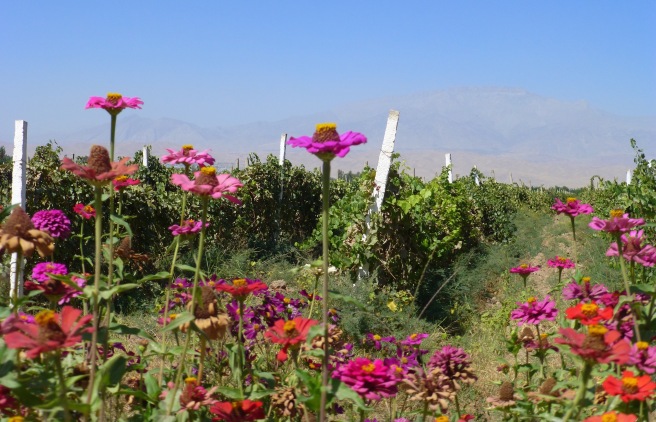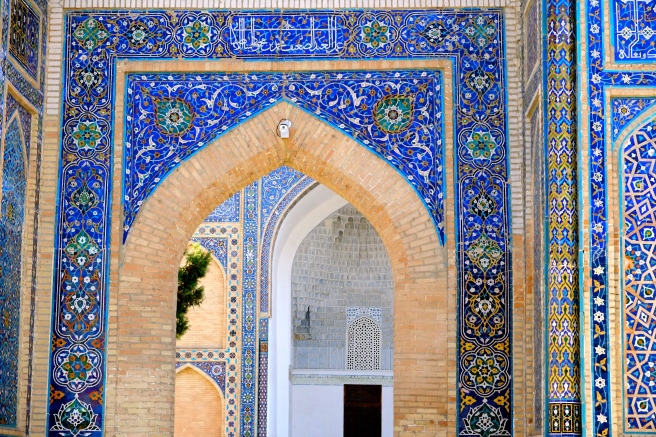Fast facts Uzbekistan:
- The region’s cradle of culture for more than 2 millennia and proud home to a spellbinding arsenal of architecture and ancient cities
- Hospitality is an essential element of daily life, which we experienced every day in the non-tourism-spoilt countryside
- The country is famous for plov (fried rice), which we could hardly get – cooking time is about 2 hours and usually needs to be pre-ordered
- Population: around 30 million people
- Neighbouring countries: Kazakhstan (North), Kyrgysztan and Tajikistan (East), Afghanistan (South), Turkmenistan (West)

20 – 29 September, 2015 – After almost 70km of easy cycling we reached the border at 1pm, changed some money at a really bad rate and got three huge piles of banknotes or 500,000 Sum, worth around 80 EUR. From now on we would carry our money in plastic bags as our wallets couldn’t bear so many bills. We made it easily through Tajik customs after our passports had been registered or checked at three different checkpoints and then arrived at the Uzbek border. We knew things would become more difficult now. We had thoroughly counted all our money in advance because we had to declare every penny. As there was only space for three different currencies on the form I almost panicked: I still had 0.20 Tajik Somoni (0.03 EUR) in my wallet and Johan received from our Australian Soccer friends Omani Real. We heard stories from other travellers who had to pay huge fines for not having declared their cents! Once we had filled in our forms the real inspection would begin: the customs officers made us open our panniers and emptied all of them. We had to start our computers and cameras so they could look at our pictures and everything else that’s on there. Johan had to give them a copy of a photo taken from an aluminium factory – the Uzbeks now officially appointed him as a spy. They were also very interested in the books we are reading! About 1.5 hours later we could continue our journey on slightly undulating roads. All we saw to our left and right were cotton, vegetable and fruit fields and small stalls selling grapes and apples.






As it was difficult to find a spot for wild camping without being seen – there were people everywhere and we felt a bit like being back in India: each time we stopped within a few minutes we were surrounded by a crowd – we asked at people’s houses if we could pitch out tent in their garden or on their field. Without hesitating they invited us into their house, prepared tea, bread and sweets for us and gave us a room to sleep. Sometimes we could cook our own food but still had to eat their bread and cookies. We slept on the ground on thin mattresses that were piled meter-high in their living rooms, always ready to serve fellow travelers.







On our third day travelling through now mountainous countryside we passed a police checkpoint at around 3pm. The police officer asked for our hotel slips and as we had none he made clear to us that we had to register at a hotel tonight. You need to know that it is mandatory in Uzbekistan to register at hotels at least every third day otherwise you’ll get into serious trouble at the border once leaving the country. Before this checkpoint we weren’t really worried about the registration and as this had been a tough day with a lot of climbing and headwinds we had planned to look for a camp spot or homestay once more. The distance to the next hotel was still around 50km. With a continuously undulating road and very strong headwinds we knew we would never make it to the town before nightfall and decided to hitch a ride. The first truck driver immediately stopped – but he was from Iran and his truck sealed – no way we could have squeezed our bikes in his cabin. Then another truck stopped and three men stepped out. After we made ourselves understood they had a huge discussion amongst themselves. As far as we understood there was another police checkpoint in about 35km and one of them wanted to take us and the other one didn’t, given the risk with the police. People in Uzbekistan also aren’t allowed to invite foreigners into their homes, let alone give them a lift. Ten minutes later our bikes were loaded into the truck and we were sitting next to them on a soft blanket trying to sit stable and at times jumping up a meter given the many potholes and the fact that the driver might have forgotten about his fragile freight. About an hour later we arrived a few hundred meters before the checkpoint, unloaded and repacked our bikes, thanked the driver and cycled the remaining 15km to the hotel. 

On our way to our first longer stop at Samarkand we had to cross a few unexpected passes, often struggling with headwinds and bad roads that looked as if a cow had shat asphalt. We met lovely people who sweetened our days with fruit and other goodies. We also met a few not so nice people: At a restaurant where they tried to screw us by asking far too much money for what we had. In the end we paid one third less than they asked for and we were quite upset as they had tried to ask extra money for napkins next to the 10% service fee.


After almost two months on the road through amazing landscapes we were now looking forward to some sightseeing of ancient towns featuring old Islamic architecture. Our first planned stop was Shakhrisabz, Timur’s hometown who in the 14th century turned the town into an extended family monument. Timur is considered the last of the great nomadic conquerors of the Eurasian Steppe. All that is left of his monuments is a gigantic 38m-high gate covered with gorgeous unrestored, filigree-like mosaics. Unfortunately most of the old town had been broken down for renovation at the time we visited and we continued our journey to Samarkand the same day.


We entered Samarkand from a part that most likely no tourist will ever get to see. Several times I checked our online map to make sure we are entering the town and not going to some small villages. The road into town was non-existing, dusty, pebbly and pot-holed, just one big disaster. Small shops and houses lined the road and we felt sorry for the people having to live here. Only two kilometers before we reached the center the streets would improve.






Samarkand is a key Silk Road City and already Alexander the Great who took the town in 329 BC said: “Everything I have heard about Marakanda is true, except that it’s more beautiful than I ever imagined.” We really liked Samarkand despite knowing that most of the monuments have been restored by the Soviets and only few original parts remained. And while some parts of the town felt a little like Disneyland with its clean alleys, souvenir shops and cafés, these gigantic medressas, mosques and mausoleums made quite an impression on us knowing they belong to the world’s oldest preserved buildings.
Samarkand impressions:














At the Samarkand market, where you can get everything from…










